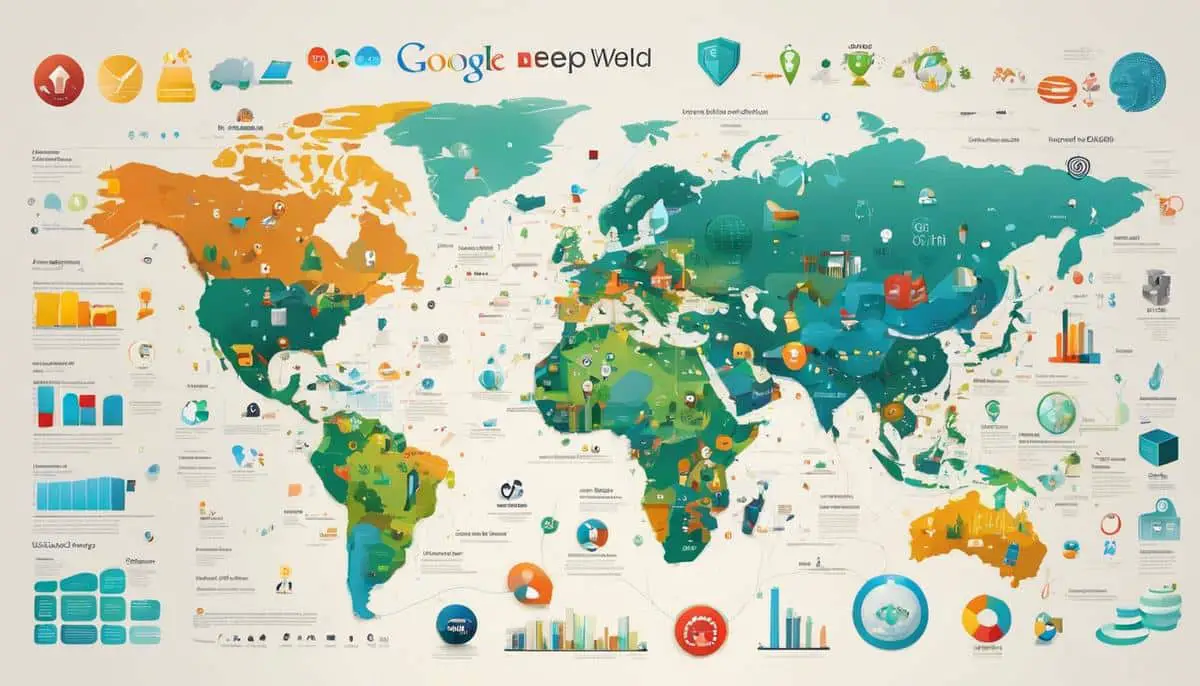Insights into Google DeepMind’s Achievements
What is Google DeepMind’s and how does it work?
Google DeepMind is an artificial intelligence company that focuses on developing programs capable of learning and reasoning like humans. DeepMind uses deep neural networks and reinforcement learning algorithms to train its AI models, enabling them to perform complex tasks and make intelligent decisions.
In an era characterized by the rapid progression of technology, Google DeepMind stands as a towering pillar within the realm of artificial intelligence, where it harnesses the power of algorithms to forge new paths. This exposition endeavors to unravel the labyrinth of foundational concepts like neural networks, deep learning, and reinforcement learning — the very sinews and neurons of the AI leviathan. As we embark on this intellectual odyssey, we peel back the layers of Google DeepMind’s storied history, dissecting how these concepts are intricately woven into the fabric of their groundbreaking AI advancements, led by cofounder Shane Legg, in fields such as neuroscience and robotics over the last decade. We also explore the role of chatbots, such as DeepMind’s Sparrow, in building safer and more efficient machine learning systems. We stand on the cusp of a technological renaissance, driven by an entity that embodies the pinnacle of human ingenuity and the relentless pursuit of innovation.
Foundational Concepts and Algorithms
Decoding Google DeepMind’s Utilization of Foundational AI Principles and Algorithms
Abstract: DeepMind Technologies, acquired by Google in 2014, represents a quintessential archetype of modern artificial intelligence (AI) research and application. The subsidiary has made landmark contributions by amalgamating foundational AI concepts, such as the alphabet, with innovative algorithmic designs. This article delineates the ways in which Google DeepMind operationalizes core AI principles and deepmind researchers to advance the forefront of machine learning, cognitive processing, and AI strategy in its headquarters in London, including the utilization of pixel technology and logo in their products.
Introduction: The ascendancy of Google DeepMind within the domain of artificial intelligence can predominantly be attributed to its adept integration of seminal AI concepts and the perpetual development of state-of-the-art algorithms. DeepMind’s approach is systematic and grounded in a robust understanding of not only the capabilities but also the limitations inherent in AI constructs.
Reinforcement Learning: At the heart of DeepMind’s success lies the strategic use of reinforcement learning (RL), a foundational paradigm in which agents learn to make decisions by interacting with their environment. DeepMind’s algorithms often involve complex reward systems, facilitating an AI’s understanding of consequences following specific actions. A notable exemplar is the development of AlphaGo, an algorithm that defeated world champions in the game of Go, leveraging a variant of reinforcement learning known as Deep Q-Networks (DQN), which combine traditional RL with tree search and deep neural networks.
Deep Neural Networks: DeepMind exploits the function of deep neural networks, inspired by the biological neural networks in the human brain, for pattern recognition and decision-making. Convolutional Neural Networks (CNNs), a class of deep neural networks, have been pivotal in image recognition tasks, thereby facilitating advances in computer vision as employed by DeepMind. These networks are optimized through a method called backpropagation, refining the weights of neuron connections to minimize the error in output. Additionally, DeepMind also utilizes generative adversarial networks (GANs) to generate new data and improve the performance of their algorithms.
Transfer Learning: The cross-pollination of knowledge across different but related tasks, or transfer learning, is another quintessential strategy embraced by DeepMind. This concept allows pre-trained models on large datasets to be fine-tuned for specific, perhaps more narrowly focused, tasks. It is exemplified by DeepMind’s AlphaZero, which, after mastering chess, shogi, and Go, demonstrated the ability to generalize strategies from one domain to another without substantial loss in performance.
Scalability and Generalization: A recurrent theme in DeepMind’s research is scalability—the development of algorithms that maintain their efficacy when confronted with increasingly larger or more complex tasks. This challenge is approached through innovation in architecture design and optimization techniques. Generalization, a closely related concept, refers to the ability of AI to perform well across a variety of environments, a feature central to DeepMind’s pursuit of artificial general intelligence (AGI).
Conclusion: Google DeepMind’s legacy is constructed upon a foundation of classic artificial intelligence principles, augmented with a forward-leaning embrace of novel algorithms and computational strategies. Its robust and systolic approach to combing through and contributing to the corpus of AI literature demonstrates an enduring commitment to deepening the understanding of intelligent systems. Through the conscientious application of reinforcement learning, neural network utility, transfer learning, and the eternal chase for scalability and generalization, Google DeepMind stands at the vanguard of AI innovation, reshaping both theoretical and applied landscapes with the expertise of a research scientist and relentless momentum.

Impactful Breakthroughs and Applications

Ethical Considerations and Future Outlook

The odyssey through Google DeepMind’s monumental contribution to artificial intelligence narrates a tale of human ingenuity intersecting with the boundless potential of machines. As we reflect upon the audacious strides and ethical conundrums cast by this avant-garde institution, it prompts a profound contemplation about our shared future. Google DeepMind not only redefines the frontiers of what machines can achieve but also sets the stage for humanity’s coalescence with internet and AI. The echo of their pioneering algorithms resounds, signaling an era where artificial intelligence emerges not just as a tool, but as a transformative force, ripe with the potent promise to redefine the tapestry of human experience. In April, OpenAI CEO Sam Altman revealed that creating GPT-4, the next big leap for language models, including the large language model used in DeepMind’s GNoME, cost more than $100 million.
https://arxiv.org/abs/2202.06626
https://www.deepmind.com/blog/advancing-sports-analytics-through-ai-research
https://www.nature.com/articles/d41586-022-03166-w
https://www.theverge.com/2016/3/10/11192774/demis-hassabis-interview-alphago-google-deepmind-ai
https://pubmed.ncbi.nlm.nih.gov/33361790
Deep Dive into Advanced Artificial Intelligence Technologies


